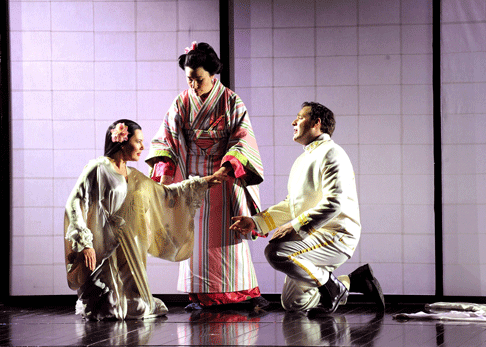And a worthy tribute it is. This season’s cast is easily the strongest that Minghella’s staging has yet enjoyed here at the Coliseum (it’s a co-production with the Met, and the Lithuanian National Opera). Judith Howarth returned to the title role from the last revival, with a portrayal that has grown in stature since the last time. Her fullish lyric soprano remains a touch on the light side, but gives a real sense of being at one with the orchestra, and picks out the delicacy of the dialogues with Pinkerton and Suzuki; she draws the character with just the right balance of strength and vulnerability.
The two men, both appropriately imported from the USA, are new to both the production and the company; Brian Mulligan’s Sharpless is particularly worthy of praise, acting with skilled subtlety such that every inner thought came across. Bryan Hymel sings Pinkerton in a strong, clear tenor; if his phrasing is rather linear and matter-of-fact it only serves to add to the superficiality of the character.
In fact, the whole staging serves to highlight Pinkerton’s superficiality, or rather the superficiality which he ascribes to Nagasaki and its inhabitants. The drama unfolds in a world of heightened, fantastical colours, the vibrant hues of Han Feng’s costume designs contrasting with the shiny black letter-box of a set, evoking the curiously chaste exoticism which so fascinates Pinkerton. Two of Blind Summit Theatre’s brilliant bunraku puppets act as Suzuki’s co-servants, introduced by Goro in Act 1 while Pinkerton is cooing over the novelty value of his new marital home; it is quite clear before he even states it overtly that Cio-Cio-San stands no chance of being treated as a ‘real’ wife. The most fully characterised of the puppets is that used for Butterfly’s young son, the intricacy of its movements almost bringing the child to life - but retaining that layer of artificiality which underlines that even Sharpless to some extent doesn’t have a full understanding of the Japanese as human equals. The orchestral prelude to the final scene features a dream sequence in which a puppet Cio-Cio-San is reunited in a pas de deux with a human Pinkerton; a realisation of a deeply held wish on Butterfly’s part, but at the same time almost an acceptance on her part of his perception that the two belong to separate worlds.
Ultimately, this approach results in a degree of emotional frustration for the audience; somehow I want Pinkerton to be jolted too late into recognising Butterfly for the person she is. I yearn for a sudden gear-change into ugly realism at the end; for Butterfly’s suicide to be graphic and literal. Instead, the blood flowing from her body is unfurled in red silk by balletic extras. It all makes a consistent point; Pinkerton is going back to his convenient, socially-sanitised American existence, and perhaps he never will truly grasp the magnitude of what he has done to his first wife back in Nagasaki.
 Judith Howarth as Madam Butterfly, Christine Rice as Suzuki and Bryan Hymel as F. B. Pinkerton
Judith Howarth as Madam Butterfly, Christine Rice as Suzuki and Bryan Hymel as F. B. Pinkerton
If there is a shortage of raw emotion on stage, there is an abundance of it in the pit. Edward Gardner, fresh from his revelatory Peter Grimes, gives a blazingly passionate account of the score, unequalled in my memory - and the chorus have rarely sounded better, either; the humming chorus was firm in intonation and ethereal of timbre. The supporting cast is exceptional, particularly Christine Rice’s Suzuki and Michael Colvin’s Goro.
Ruth Elleson © 2009

